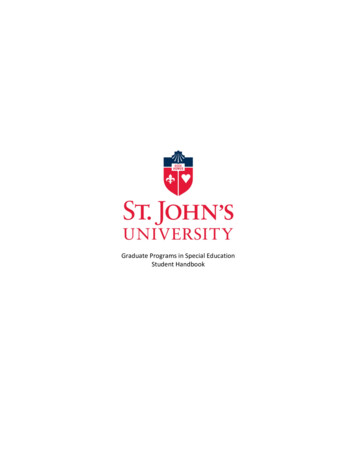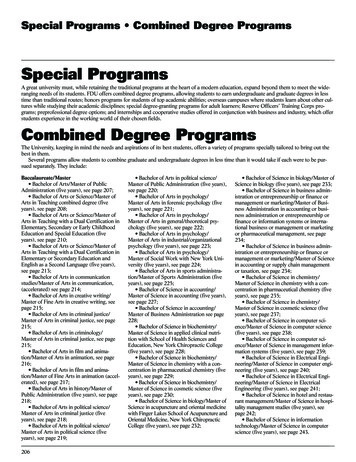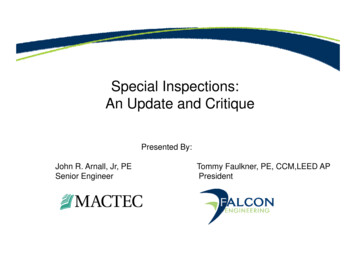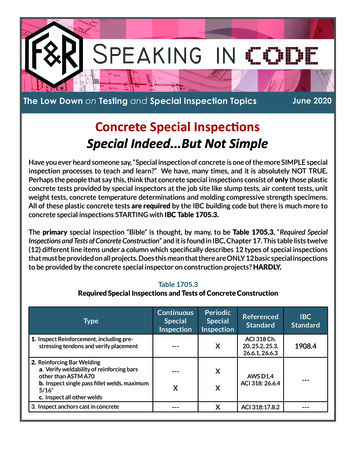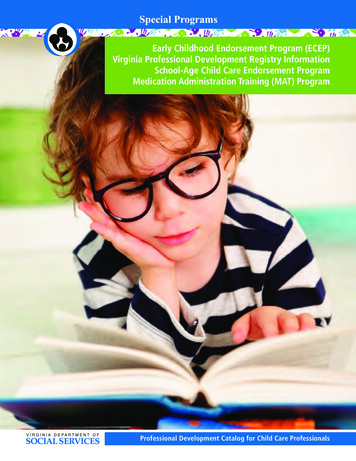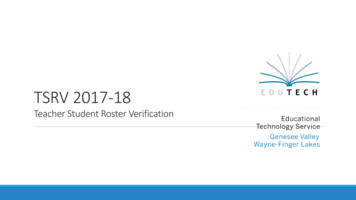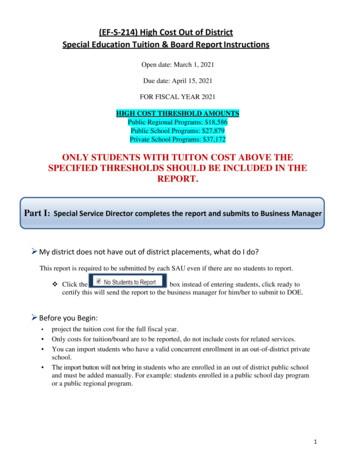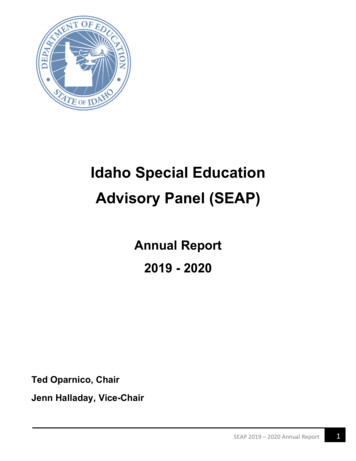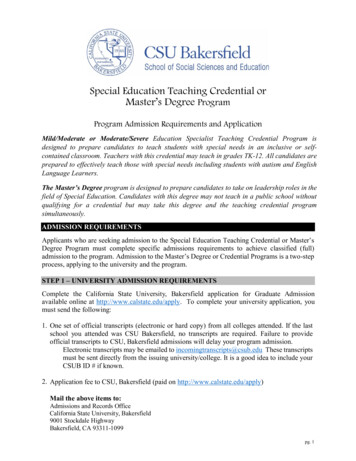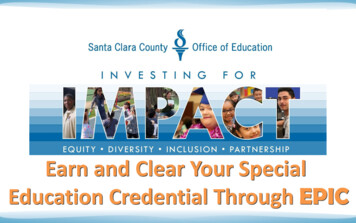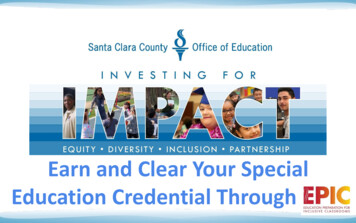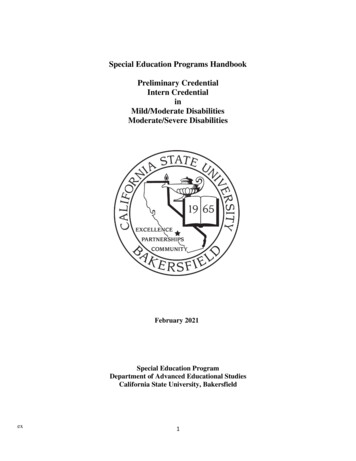
Transcription
Special Education Programs HandbookPreliminary CredentialIntern CredentialinMild/Moderate DisabilitiesModerate/Severe DisabilitiesFebruary 2021Special Education ProgramDepartment of Advanced Educational StudiesCalifornia State University, Bakersfieldex1
TABLE OF CONTENTSFORWARD. 4CHAPTER I. INTRODUCTION . 5Special Education Program Philosophy and Mission Statement . 5Program Goals . 5Special Education Preliminary Credential Program Model . 7Program Design and Coursework Sequence . 8Preliminary Credential Program Admission Requirements and Procedures . 10Intern Credential Program Admission Requirements. 11Intern Credential Program Application Sequence . 11Special Education Program Application/Admission Timelines. 12Exceptional Admission Policy . 12Candidates’ Interview with Academic Advisors. 12Special Education Faculty Advisors . 14Waivers and/or Transfer Credit/Out-of-State Credential . 14Requirements for Continuing in the Special Education Program . 14Application Process for the Preliminary Special Education Credential(s) . 16CHAPTER II. SPECIAL EDUCATION FIELD EXPERIENCE . 17Introduction . 17Field Experience: Student Teaching/Intern Terminology . 17Field Experience Categories and Information. 17Field Experience Courses . 19Field Experience in a Private School Setting . 21CHAPTER III. CSUB Appeal Process for the Disposition Assessment . 23Procedure for Initiating Appeal . 23Student Appeals Committee Membership . 23Attendance at the Hearing. 23Procedure . 23Recommendation of the Student Appeals Committee . 24Candidate Improvement Plan . Error! Bookmark not defined.CHAPTER IV. Other Helpful Information . 29ex2
How to Reach Program Faculty . 29List of Program Faculty and Staff . 29Appendix A. 50 Hours of Course-Based Field Experience Requirement . 30Appendix B. Student Teaching Handbook . 35ex3
FORWARDYou are commended for seeking to enter the teaching profession. The role of the teacher in today’s society is ofgreat importance. You are choosing to enter a profession that can make a difference for both the individuals youaffect and society at large.The purpose of this handbook is to provide you with information necessary to obtain the Special Education(Preliminary) Credential and/or a master’s degree in Special Education at California State University,Bakersfield. Each credential is designed to meet the unique needs of the local community as well as statestandards.Our professional credential programs are designed to provide candidates with the skills, knowledge, andattitudes that can ensure competence at the beginning of their careers and lay a solid foundation for life-longprofessional growth. We believe that good teachers must constantly reflect on their professional skills andendeavor to meet the changing needs of their students. Our goal is, therefore, to produce caring and reflectivepractitioners who are capable of meeting the educational challenges of the 21st century.The program faculty is here to assist and advise you. Upon admission, you will be assigned a faculty advisor tohelp you with any questions or problems as you proceed through the Special Education Program. Please feelfree to contact Special Education Program faculty.Special Education Program FacultyYeunjoo Lee, Ph.D.Professor, Program DirectorSarana Eyire Roberts, Ph.D.Assistant ProfessorDiane McNett, M.A.Full Time LecturerMatthew Kabel, M.A.Full Time Lecturerex4
CHAPTER I. INTRODUCTIONThe Special Education Program at California State University, Bakersfield provides exemplary credential andmaster’s degree programs in mild/moderate or moderate/severe disabilities. The program also offers an EarlyChildhood Special Education Added Authorization program. All programs are accredited by the CaliforniaCommission on Teacher Credentialing (CCTC).These programs are designed to provide candidates with the knowledge and competencies necessary for earning aSpecial Education credential or master’s degree either in mild/moderate or moderate/severe disabilities.The Preliminary Credential is valid for five years, and during this time the candidate must obtain a cleareducation specialist credential. CSUB does not offer a Clear education specialist credential program.To apply to the Special Education Program, each candidate must complete an application file as described in thisHandbook. An information session is scheduled twice each semester, and candidates must attend the informationsession the semester before they intend to start the Special Education Program.Special Education Program Philosophy and Mission StatementProgram Philosophy and Rationale:The Special Education Credential Programs at California State University, Bakersfield (CSUB) are guided by thephilosophy and based on the laws (PL94-142, PL101-457, PL105-17, and PL114-95) that all individuals in oursociety have the right to be educated in the least restrictive environment to fulfill their individual needs and becomeproductive and/or participating members of society by developing their optimal potential.The Special Education Programs are grounded in the School of Social Sciences and Education mission statementand motto, “Enhancing Minds, Engaging Hearts, Enhancing Communities”. The motto provides a conceptualframework for all professional education programs within the School. In particular, the mild/moderate andmoderate/severe credential programs have been developed through the joint efforts of CSUB special education,general education program faculty, and local area practitioners who are committed to influencing the practice ofteaching students with special needs.Program Mission StatementAt CSUB, our primary mission is to prepare future special education teachers who can work effectively withstudents with mild/moderate or moderate/severe disabilities. Our students develop the instructional, interpersonaland management skills that are critical to success in this field. Graduates become effective teachers and caring,reflective, and decision-making professionals.A common thread throughout the program is the philosophy that the education of all youth is the sharedresponsibility of general education classroom teachers, special education teachers (education specialists), parents,administrators, and related support personnel. Therefore, the program prepares personnel to work in schoolsemphasizing the skills necessary for successful school collaboration efforts.Program GoalsThe Special Education Credential Programs at CSUB integrate both theoretical models and classroom practices toaddress the reality of the students with mild/moderate/severe disabilities. The following goals were identified byex5
the university’s Special Education and Teacher Education faculty members and the Community AdvisoryCommittee, including the Kern County SELPA leadership:1. The program is unified by the common, overall goal of helping candidates become reflective practitioners who areable to draw upon a variety of skills and models and apply them effectively in many educational settings.2. Candidates demonstrate knowledge of the ethical standards, professional practices and laws and regulations relatedto the provision of services to students with disabilities and their families. Each candidate applies the higheststandards to his or her professional conduct.3. Candidates demonstrate an appropriate level of competency working with students from diverse backgrounds byunderstanding and accepting the differences in culture, ethnicity, gender, age, religion, socio-economic status,lifestyle orientation, language, abilities, disabilities, and aspirations of individual learners.4. Candidates develop professional perspectives by examining educational policies and existing and emergentpractices in relation to fundamental issues, philosophy and history of education, relevant legal requirements, andthe status of special education services within society.5. Candidates gain specific competencies in (a) assessing and evaluating students, (b) effectively managing learningenvironments, (c) planning and implementing curriculum and instruction, and (d) effectively communicating andcollaborating with partner public school personnel and parents.6. Candidates gain understanding of the characteristics and unique needs of students with mild to severe disabilities.7. Candidates exhibit behaviors representing the high standards demanded of the teaching profession, including theneed to participate in a learning community throughout their careers.8. Candidates demonstrate appropriate skills in positive behavior support for students with disabilities.9. Candidates demonstrate competencies in using or adapting advanced technology for their classroom teaching forstudents with disabilities.10. Candidates demonstrate knowledge of and the ability to implement factors associated with successful planning andimplementation of transitional life experiences for students with mild to severe disabilities.ex6
Special Education Preliminary Credential Program ModelThe Special Education Program is committed to the education of competent “reflective teachers” focusing oncareers in special education (mild/moderate or moderate/severe). These candidates should be cognizant of theproblems and committed to meet the need of exceptional learners. The quest of the program is to providecredential candidates with the necessary preparation to deliver educational services designed to assist exceptionalindividuals in reaching their optimal potential as productive members of society.Special Education ProgramComponents, Coursework, and CompetenciesProgram ElementsM/M and M/S Credential CandidatesCandidates enter the Specialist Credential Program in M/M orM/S. These candidates have subject matter competence andmeet candidate disposition expectations. Upon completion of allprogram requirements, candidates should progress towardbecoming reflective, effective teachers who are sensitive to thediversity of students.Educational Specialist Credential/Degree ProgramMild/Moderate (M/M), Moderate/Severe (M/S)PrerequisiteEDTE 4100: Teaching English Learners and Special PopulationsEDSP 4260: Establishing Foundations in Special EducationEDSP 4800: Early Field Experience in Diverse ClassroomsReflective Teacher-Professional EducatorBecause of his/her dedication, candidates completing allrequirements for the M/M or M/S credentials from the CSUBSpecial Education Program will become reflective teachers,prepared to educate students with disabilities, as described andpresented via the competencies established by the Mission ofthe School of Social Sciences and Education, EducatorPreparation Programs (EPP), CCTC, CEC, and the CSUBPhase I: Foundation CoursesEDSP 4250: Using Technology in Diverse ClassroomsEDSP 5250: Characteristics of Special PopulationEDSP 5230: Collaboration and Transition in Special EducationProgram CompetenciesCharacteristics of Exceptional LearnersImplement Positive Behavior SupportsDesign/Implementation of Instructional ProgramsSelection/Use of Instructional MaterialsManagement of the Learning EnvironmentsImplementation of Due Process SafeguardsWork Effectively with Coworkers and ParentsUse Data to Guide Instructional and Behavioral PlanningDemonstrate Appropriate Professional Behavior Knowledge ofStudent Mobility, Sensory Health Care NeedsImplement Effective Transition ServicesEffective Use of Instructional/Assistive TechnologyThese competencies are stressed throughout the program and assessedduring the completion of individual coursework and fieldwork.exPhase II: Skill Development CoursesEDEL 5100: Literacy and the Arts for Diverse LearnersEDEL 5200: Math Methods and AssessmentEDSP 5050: Classroom Management and Positive Behavior SupportEDSP 5100: Assessment of Students with DisabilitiesEDSP 5450/5320: Curriculum and Instruction in M/M or M/SPhase III: Culmination/Field ExperiencesEDSP 6840/6850: Student Teaching and Seminar in M/M or M/S Disabilitiesor EDSP 6860/6880: Intern Seminars/Supervision7
Program Design and Coursework SequenceCSUB Special Education Preliminary credential programs are designed to reflect the standards established by theCommission on Teacher Credentialing (CTC) and to integrate the rationale of the University with the School ofSocial Sciences and Education theme. All required components of the specialist program such as subject mattercompetency, early field experiences, and student teaching, are congruent with the expectations set forth by theCTC. Specific objectives and learning opportunities to meet the standards are assigned to particular courses in theprogram.1. Program DesignThe Special Education Programs for the mild/moderate and moderate/severe disabilities credentials progress inthe three developmental phases: (1) Foundation and Basic Understanding, (2) Skill Development, and (3)Culmination and Field Experiences.Phase I: Foundation and Basic UnderstandingDuring the first program phase, “Foundation and Basic Understanding,” special education credential candidatesstudy how special education students relate to the entire spectrum of students enrolled in today’s classrooms. It iscritical for credential candidates at this level to develop a basic understanding of: (a) characteristics of studentswith mild to severe disabilities; (b) research in learning theories and instructional practices both in generaleducation and special education; (c) communication and collaboration issues, and (d) issues related to thecurriculum and instructional adaptation for students with exceptionalities (TK-12).Phase II: Skills DevelopmentDuring the second phase of the program, credential candidates will acquire specific knowledge and skillsthrough their coursework and field experience that will enable the candidate to teach and assess the needs ofstudents with exceptionalities and manage classroom behavior. Field work in a variety of settings is integratedand required throughout Phase I and Phase II.Phase III: Culmination and Field ExperiencesIn the third and final stage of the program, credential candidates utilize what they have learned and experiencedduring the final student teaching. Candidates will have ample opportunity to demonstrate their competence inassessment, curriculum planning/instruction, and classroom and behavior management strategies. Candidateswill share their successes and/or concerns with other candidates and university field experience supervisors inseminars.In addition to incorporating several courses from the Teacher Education credential program, the coursework in theSpecial Education credential program encompasses the major areas of special education core knowledge and skillsincluding learner characteristics, assessment, diagnosis and evaluation, instructional management, behaviormanagement, social interaction skills, communication and collaborative partnerships, transition processes andservices, and professional and ethical practices.ex8
California State University, BakersfieldEducation Specialist in Mild/Moderate and Moderate/Severe DisabilitiesPreliminary CredentialDevelopmentPhaseGeneralEducationSpecial EducationMild/ModeratePrerequisitesEDTE 4100Moderate/SevereEDSP 4260EDSP 4800Phase IFoundationEDSP 4250EDSP 5250EDSP 5230Phase IISkillDevelopmentEDEL 5100EDEL 5200ECSE-AAEDSP 5050EDSP 5100EDSP 5450Phase IIICulmination/FieldExperiencesEDSP 5050EDSP 5100EDSP 5320EDSP 5510EDSP 5520EDSP 5530EDSP 5540EDSP 6840/6850orEDSP 6860/6880** Course Numbers and Titles **1. Special EducationEDSP 4250EDSP 4260EDSP 4800EDSP 5050EDSP 5100EDSP 5230EDSP 5250EDSP 5320EDSP 5510EDSP 5520EDSP 5530EDSP 5540EDSP 5450EDSP 6100EDSP 6840EDSP 6850EDSP 6860/6880Using Technology in Diverse ClassroomsEstablishing Foundations in Special EducationEarly Field Experience in Diverse ClassroomsClassroom Management and Positive Behavior SupportAssessment of Students with DisabilitiesCollaboration and Transition of Special EducationCharacteristics of Students with Mild to Severe DisabilitiesCurriculum and Instruction in M/SIntroduction to Early Childhood Special EducationFamily systems & Services for Young Children with DisabilitiesAssessment and Intervention/Instructional Strategies: Birth through Pre-KindergartenField Experience in Early Intervention and Early Childhood Special EducationCurriculum and Instruction in M/MTeaching Students with AutismStudent Teaching and Seminar in M/M DisabilitiesStudent Teaching and Seminar in M/S DisabilitiesIntern Seminar/Supervision2. Teacher Educationex9
EDTE 4100Teaching English Learners and Special Populations3. Elementary EducationEDEL 5100EDEL 5200Literacy and the Arts for Diverse LearnersMath Methods and AssessmentPreliminary Credential Program Admission Requirements and ProceduresAll documents submitted to CSUB become the exclusive property of the university and will not be copied orreturned.1. Apply for admission to CSUB on a post-baccalaureate standing (www.csuapply.edu).2. Attend the Information Session. Held twice each semester.3. Submit a complete application packet to the Credentials Office by the due date. Required application materialsinclude:a. Special Education Application Form. Form must be completed and signed.b. Three recommendation forms from those who know the candidate’s potential/work performance for specialeducation teaching career.c. Autobiog
The Special Education Credential Programs at California State University, Bakersfield (CSUB) are guided by the philosophy and based on the laws (PL94142, PL101- -457, PL105-17, and PL114-95) that all individuals in our society have the right to be educated in the least restrictive
